
Be Sure to Wear Flowers in Your Hair
Published on Jan 19, 2026
WALK OUT TO WINTER: falling in love with—and to—Aztec Camera's High Land, Hard Rain
Published on Dec 26, 2025
First Anniversary
Published on Dec 17, 2025
Introducing: The IHTOV Zine
Published on Dec 15, 2025
More Liner Notes…
Featured Conversation: Mike Huguenor
Published on Dec 21, 2024
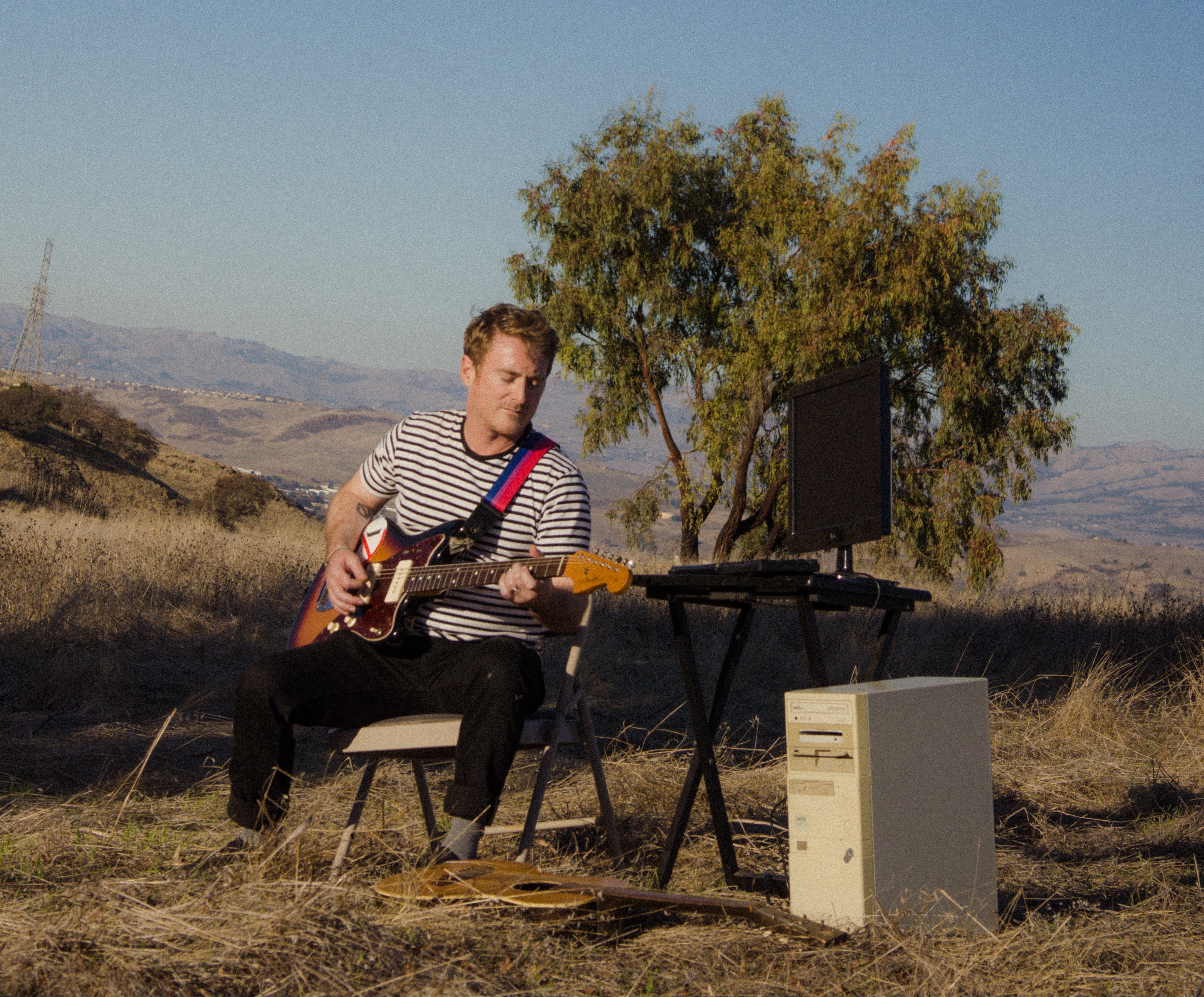
“For a while, for many years of my life, I only knew There’s Nothing Wrong with Love. Because I was like, well, this record is amazing. I’m satisfied, and I’m going to listen to this for a long time, basically. And I did, and then it was only after a few years or so, I was like, okay, let’s, let’s add another into this. Because now I want more, and there’s more I can listen to, kind of and so it’s like allowing yourself a chance to continue to find stuff by someone you really love.”
Would you like to introduce yourself?
My name is Mike. You know, I am mostly known as a musician, though I am also a writer, and I now have my first book coming out in a little while, but my main life has been as a musician in indie rock and punk bands. People mostly know me now as the guitarist for Jeff Rosenstock, and I’ve also played in the bands Shinobu and Hard Girls and Classics of Love, and then a bunch of other projects along the way, but those are the ones where I was more creatively involved. And then, yeah, I’ve been writing - music journalism and then Alt weeklies and things. And then just recently, I have been writing the biography of Asian Man Records.
That’s awesome.
Thank you. I’m really excited, and, I don’t know, just honored to be able to be sharing it, because I feel like it’s a lot of information and stories that really should be shared. I feel very lucky to be part of it.
So how did you get into collecting records? Is it something you’ve been doing since you were a kid, did someone in particular get you into it?
Well, you know, my dad collected vinyl. So when I was a kid, there was always vinyl in the house, and there was always a record player there. But, I was born in 1984 so I was squarely in the CD era, really, when I was a kid. And then there was a period of time around then when, because CDs were the big thing, nobody was buying vinyl, and you could go to a record store and find versions of records you liked for like, $3, and so during that time, I found a couple records though I’d never really thought about building a collection. But then I started getting more into music that wasn’t just punk music, because I was really only into punk music for a really long time, and then once that started expanding, I was like, Oh, I can find copies of Springsteen records for like, $3 and Electric Light Orchestra records for $3 and all these. So I started building up a collection of some of that stuff. And then, I began getting into it a little more once I started doing that.
But one thing I really like that immediately grabbed me is just that I love that it [listening to vinyl] changes the way a record works and you listen to a record, that it suddenly has two beginnings and two ends. And that was something where I was just like, this is cool. It’s a cool thing. And I just started enjoying it. And then I started to just build, getting more into it and buying it became the only form I really started, like, actively continuing to buy after MP3s kind of made it hard to feel the same about physical media.
So you stopped buying CDs and got into vinyl.
At that time I was graduating high school and getting into college and stuff, around the time when it was all file sharing and all that. And, like, it went from me learning about music by friends who worked at a college radio station, and so I would go there and just burn CDs of stuff in the library, and then learn about bands that way. And then it was like, Oh, now just anything is basically a burnable CD, and a CD is basically like a CDR, and it became hard for me to think of it the same way. Yeah, so the vinyl feels much more like, I don’t know it feels more invested, because it’s like a very physical thing, that is physically in the grooves and physically in this object that is three dimensional, and I don’t know it’s just so different. Vinyl feels more real to me than any other format.
I worked in a record store when CDs first came out, and it was a good two years before I would buy one.
It’s so different and I can understand that because you were already from vinyl, yeah? Yeah, I get it. CDs don’t necessarily sound better, it doesn’t look better. It was just quicker and flashier. It made sense at the time.
Do you have a most treasured record, something that really means a lot to you?
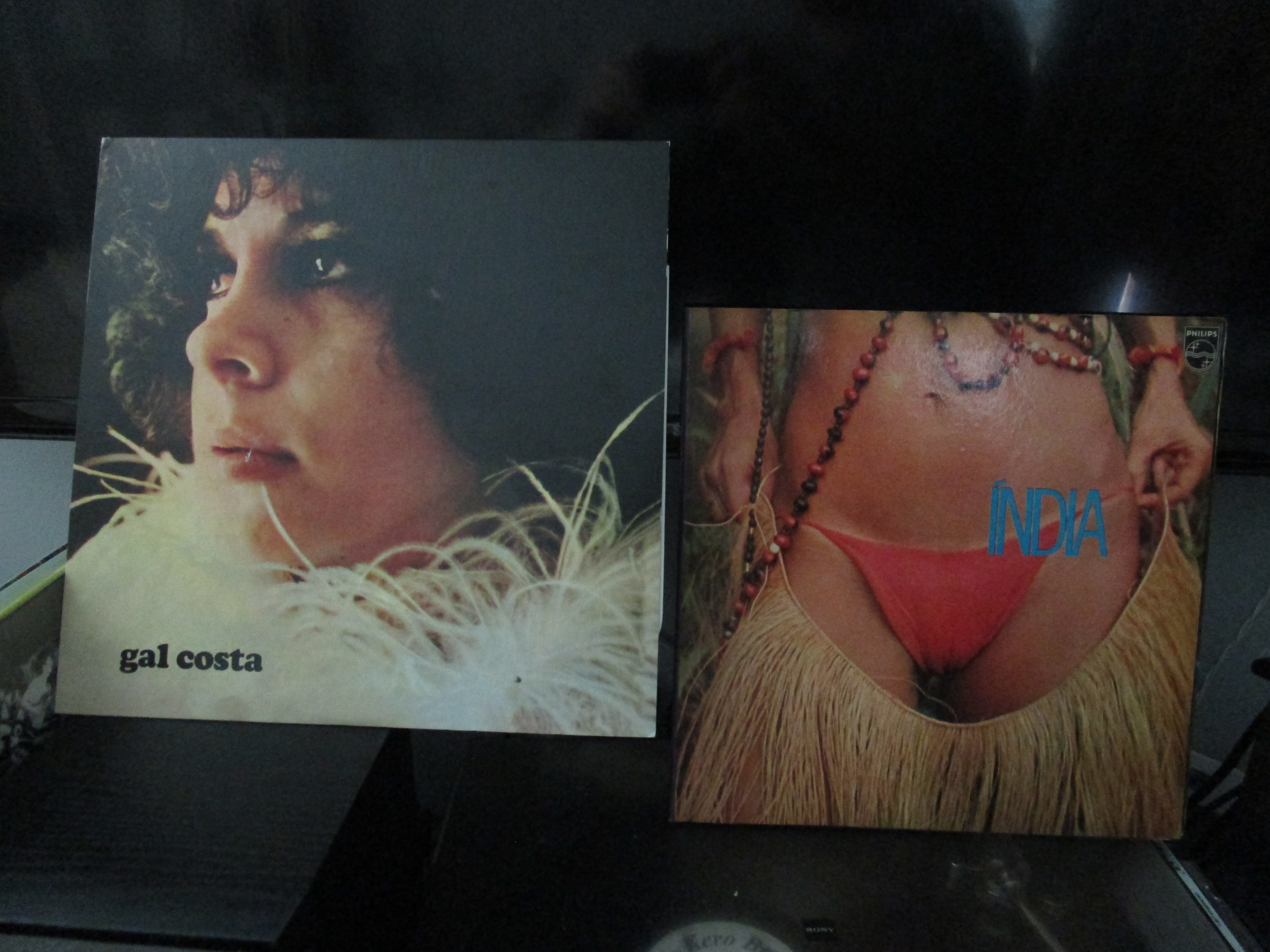
You know, it’s hard to say exactly, most treasured, but two that I really like feel so happy to own and often put on and often come back to, a person I talk about often, and one of my more modern big influences is Gal Costa. And these two records, her first self titled record, and the record India. They’re from ‘69 and ‘72. [Self-titled] is one where I got into her and was like, okay, now I need to own these records. And it was that kind of a time for me, also where I was thinking more about vinyl and building out, like, the things that I want to put, I want to invest that energy into, I want to put on albums and spend the day with them and stuff. And these are records that I was immediately seeking out. This one I was able to get, because there was a reissue at the time. But then the other one I had to, like, order from South America somewhere. I put them on all the time, and they are very much like, crucial. And then I was really like, this is what I want to have. I want to have a home, and I want to be able to put on music like this and surround myself, build out my own little life and story that I’m living.
Nice. Do you have a record that was your big score, that you were really proud of getting?
The Duster record 1979. Duster are from San Jose and are having a kind of resurgence, and I think even, like maybe a Gen Z resurgence. I forget exactly how it happened, but it was like modern audiences discovered Duster and fell in love with this slowcore band. But they were in San Jose at the time, just another band struggling to find an audience. Basically, San Jose shows are often very…there’s a lot working against you in San Jose, because it’s very expensive and things don’t get promoted very well, and then it’s got this…the Bay Area has all these narratives about it and everything, but really, it’s a very awesome city and and if I can find this record, I’ll show it to you. Duster was a band that has become really loved over the years. I think being able to find one where, like, there is this, there’s still a sticker on it.
You had been looking for it for a while?
It was one of those things that I stumbled on. And I, at that point, I was like, wow, people didn’t realize that it would be a band that would mean as much as it does now, basically, and growing up in this area, I think they were really taken for granted. And so now I guess it’s become more like a hindsight, right, rather than a search.
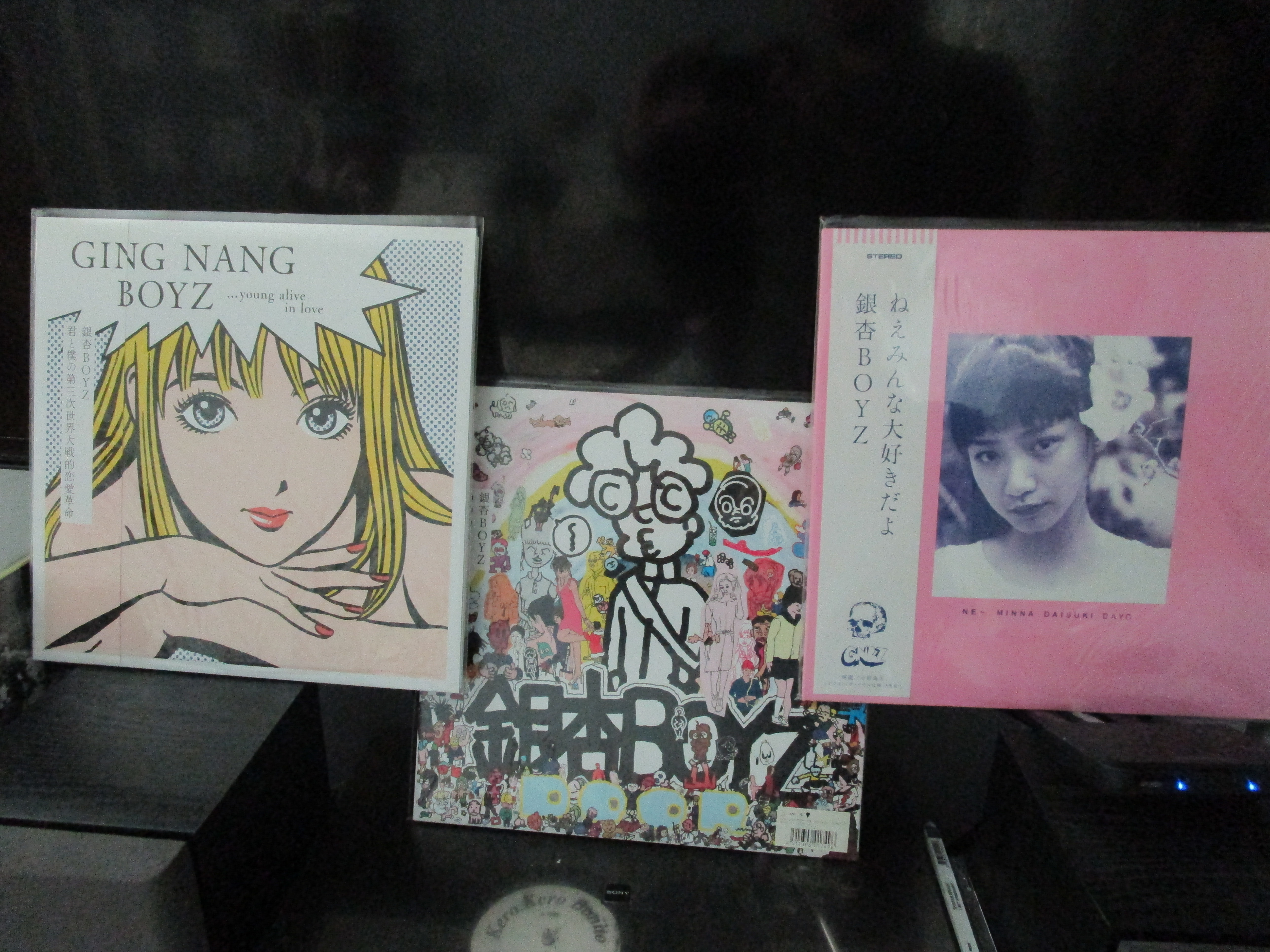
One other one that I’m really happy to have is these records by the Ging Nang Boyz boys. They’re a Japanese punk band that meant a lot to Shinobu. We are big fans of them, and then we kind of became friends with them. When I played in the band Classics of Love, the singer Jesse Micheal from Operation Ivy was in that band, and the singer of GIng Nang Boyz was a big fan of Operation Ivy and wanted to use a sample on one of their new records. And so I was able to put them in touch and get the sample cleared, and they sent me copies of the records afterwards. So that’s another one that I’m really proud to have in the collection.
Do you have white whale record, something you’ve been looking for but haven’t been able to find?
Yes, definitely. I haven’t, and some are more common than others, but I haven’t found a copy of David Bowie’s Low, that’s really hard to find on vinyl. I love that record, and I really want to, that’s one that I want to be able to have, you know, and play. There’s one Gal Costa record in between these two, her other self titled record that is the one that got me into her, and my favorite, but is also kind of her white whale. So that one I’m searching for as well. I don’t think it’s been repressed either. So it would have to be like a 60s Brazilian copy or something.
And there’s a few others I really want, there’s another Brazilian musician I really like, Gilberto Gil and one of his records, I’m searching for as well. Then some Alice Coltrane stuff as well. I love Alice Coltrane. I have only one of her records, and I’m searching for others of the period when she was playing with, like John Coltrane’s band. I love, I love, just love that stuff. It’s beautiful. Those are big ones that I’m searching for.
Are you a completionist? What artist would you say is most represented? Do you like to complete discographies?
To be honest, I don’t like to complete discographies, even as a listener, sometimes specifically, because I love to be able to continue to find stuff that I love, and it’s hard for me to have a band I really love and feel like, well, I’ve heard everything they ever did, you know? I want there to always be like, more to discover. And so this is a little embarrassing, but there are a couple Built to Spill records I’ve never listened to, and I love that band. For a while, for many years of my life, I only knew There’s Nothing Wrong with Love. Because I was like, well, this record is amazing. I’m satisfied, and I’m going to listen to this for a long time, basically. And I did, and then it was only after a few year or so, I was like, okay, let’s, let’s add another into this. Because now I want more, and there’s more I can listen to, kind of and so it’s like allowing yourself a chance to continue to find stuff by someone you really love.
That makes sense, yeah? Because once you have the entire collection, you’re like, am I done with them? Is that it?
Exactly, yeah. It leaves something to continue to look for. It never feels good to be totally finished with something you love, where you want to have more of it, basically. Of the ones that I have a lot of, oh, and actually one that almost have all of, and I’ve slowly, I just recently made the decision that I need to buy the last record to complete it would be the Weakerthans. One of my favorites, definitely one of my favorite bands. But yeah, so I have Reunion Tour, Reconstruction Site and Left and Leaving, and then I also have John K. Samson’s Winter Wheat.
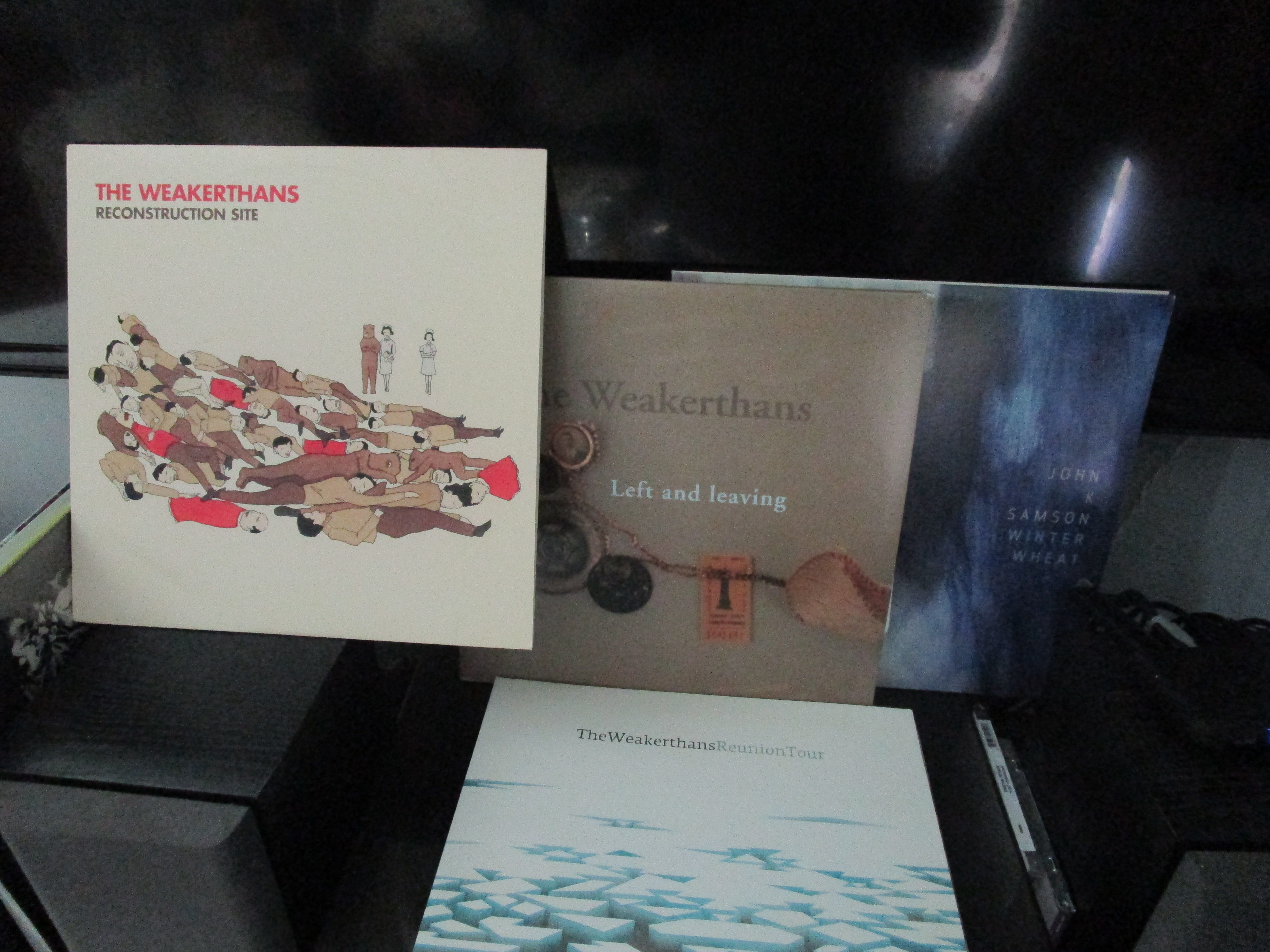
So another thing in talking about CDs. It was hard for me for a while to want to buy another copy of a record that I already owned and I had all of them on CD from back when I was a kid. Basically, I had Left and Leaving and all those and so I’ve been only more recently, like buying, you know, as I hadn’t, I didn’t have money for a very long time. I had no money, basically. And I have some money now, so I’m able to buy some records every now and then. Just great, yeah, and now I feel better about being like, I want to support a band I love and buy a new record by them. And so I’ve been buying, I’ve been buying all of those for sure, because I I love that band for sure, and that’s one where the band only has four records, and I love all of them. I experienced them all at the time I don’t get to close off parts of them, you know? I just want to own that last record because I want to listen to it.
The last thing I ask everybody is, what’s one record in your collection that you’d be most eager to share with new friends?
It kind of depends on the dynamic. I guess I feel like I have a lot of different types of friends, and I can’t get my friends to agree with me on my taste of music half the time anyway. You know, it’s like I got, I gotta take this person’s likes and this person’s likes and find it. But in thinking of one that could carry through to almost everyone, one that I really always recommend, and I find myself coming back to it all the time.
Okay, so two answers. Let me give you two answers, if that’s okay. So the one that I think should have gotten more attention during its time, is the Sidekick’s Happiness Hours record. I think this band was always really good, but on this record they just nailed it. They just nailed every part of it, and the songs are so good. The bridge of every song pulls it all together in this crazy way that just adds to it. I feel like it’s just such a good recent indie rock record, indie rock punk, right? Like, punkish adjacent indie rock record that I think melodically and performance wise, blossoms with every listen. And I’m always like, Have you heard this? And we were playing with them around that time, and I was, I remember, just like, asking them constantly, like, When are you going to put those new songs on a record? Like, when is it going to be? I just want to hear it. I want to be able to listen to the song. This is the one, I think, very sincerely - and I like their others - but this, this is it. There’s an introduction track that is kind of its own little thing. And then you’re in this record that is just so good. I love all the songs on it. And like, yeah, really awesome.
And then the other one that I’ve been recommending a lot recently is the Pharaoh Sanders and Floating Points record (Promises). I love Pharaoh. I played sax when I was a kid. That was my first instrument, and I didn’t really understand what to like about it when I played it. But after I stopped playing, I started listening to more 60s-ish jazz music, and Coltrane’s band in particular, and Alice Coltrane and Pharaoh Sanders are through the whole thred of that. And I loved his freakier records. But this one is just so beautiful and so stunning and meditative. In a way that he, I think, kind of like, always gestured towards. But from the first listen, I was just like, god damn it. This record is amazing. Why? Like, sometimes records are almost too good. I remember I didn’t own it yet, and I put it on, it was like, well, shit, now I have to go buy this because it’s so good. And, It’s a great feeling. It’s just sometimes you’re like, well, there goes my day, because now I am spending my time buying this.
Can I actually tell you one final story please?
Of course!
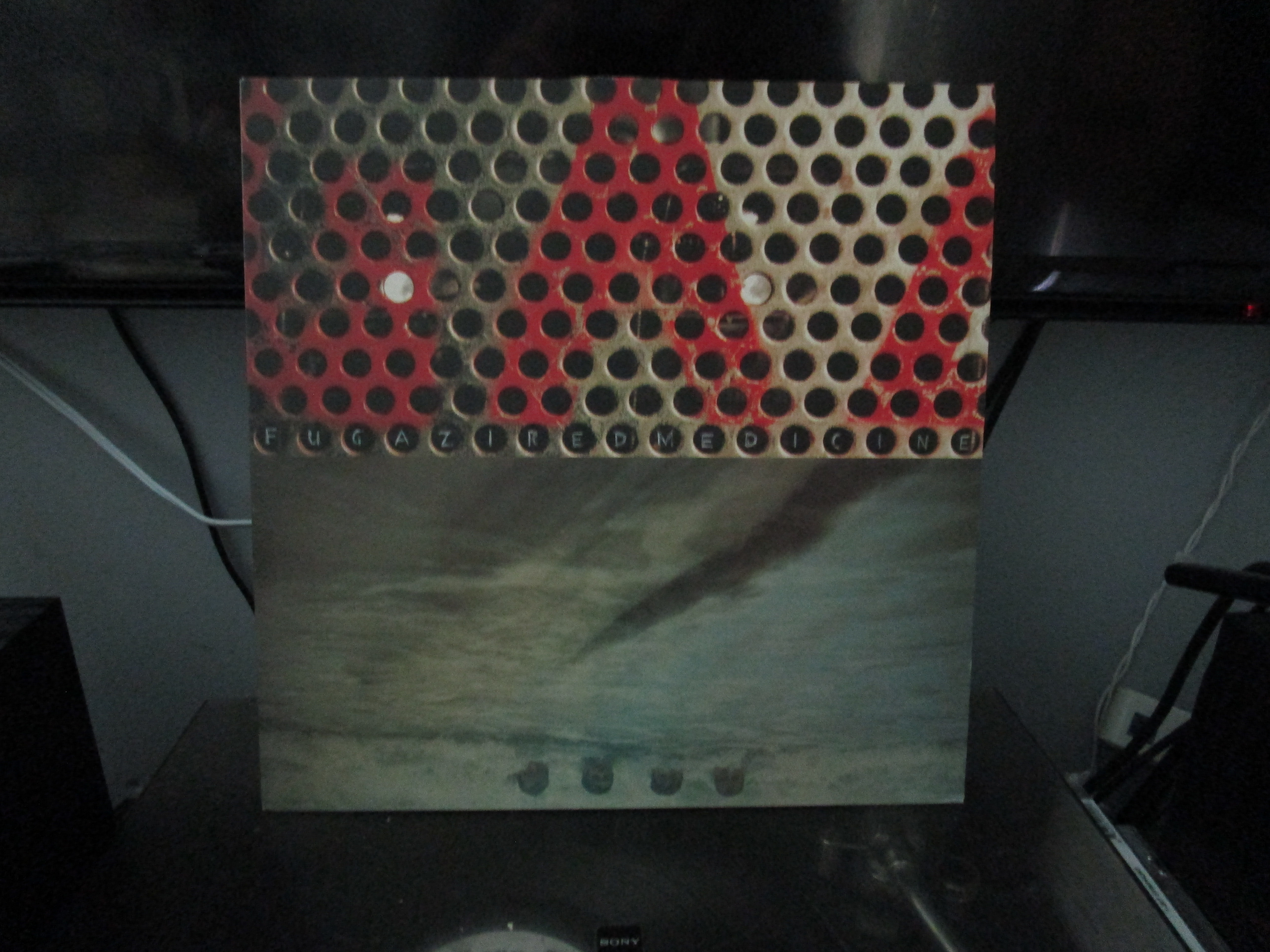
So I didn’t really know this famous band much at all. I just knew that people loved them. Then I bought a car from a friend of mine. He was the bass player in Shinobu. He was moving to Japan, and he was selling his car. So I bought his car. It was a Honda Civic, and I was looking in the trunk one day, and I found a tape of this record. I was like, oh, I never listened to this. And so I put it in, and put it in. First song comes on, and I was like, whoa. This song is awesome. The song is really, really good. And then “Bed For the Scraping” comes on, the second song. And I was like, Oh my God, this song is amazing. And then like, 30 seconds in the tape ripped. The whole tape ripped out. And I was just driving around, so I was like, well, I’m going to the record store. And so I just drove to the record store and I bought this copy of it right there. That’s awesome. Yeah, and I love this. This is still my favorite Fugazi record. And that was my first experience with Fugazi.
Wow, that’s incredible.
That was, yeah. This is one where I was actively thinking about my record collection. I was like, this is what I’m talking about. This is what I want in my record collection. So I immediately went and bought it. I was glad it was there, you know? It was like, it’s cool that you can still find copies of the records, right?
Mike Huguenor is a guitarist & writer from San Jose, CA. The guitarist in the Jeff Rosenstock band, he is also known for his work in Shinobu and Hard Girls, as well as his solo music. Formerly the arts editor of Metro Silicon Valley, he has recently been writing his first book, Elvis is Dead, I’m Still Alive: the Story of Asian Man Records, out from Clash Book in 2026.

